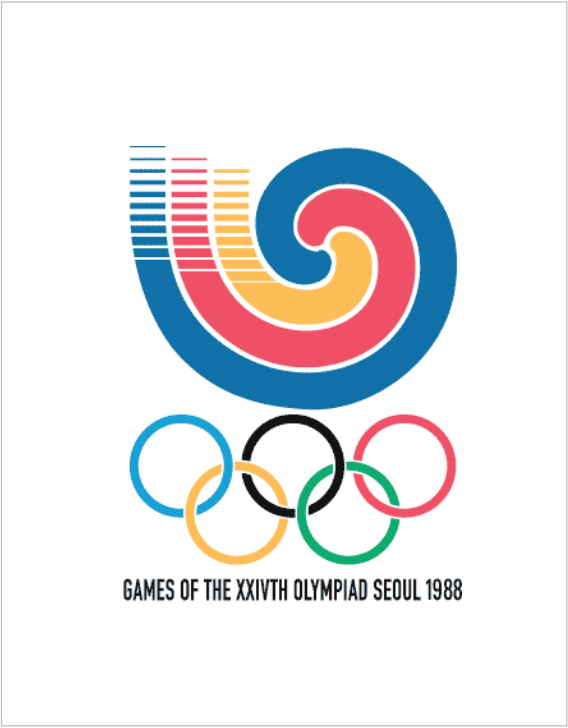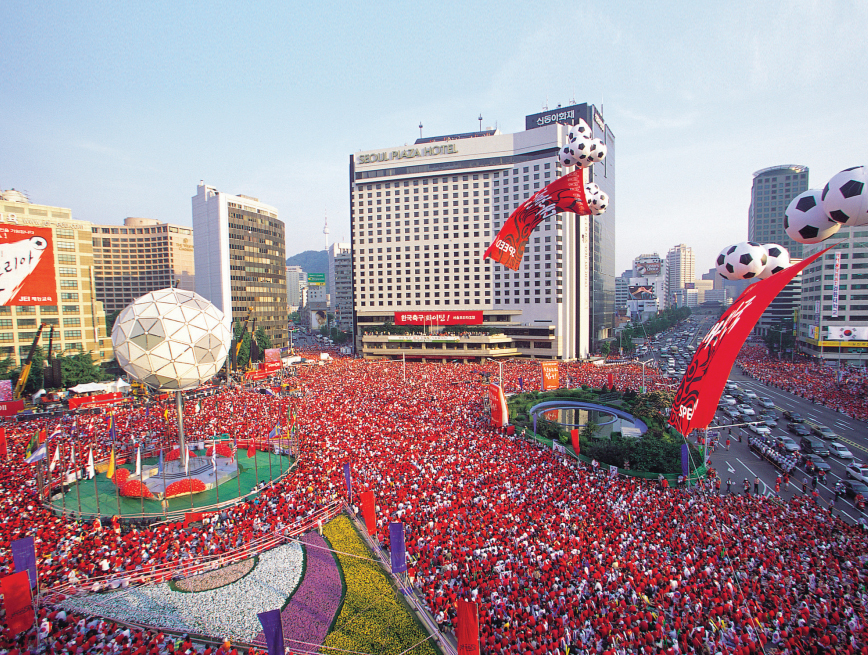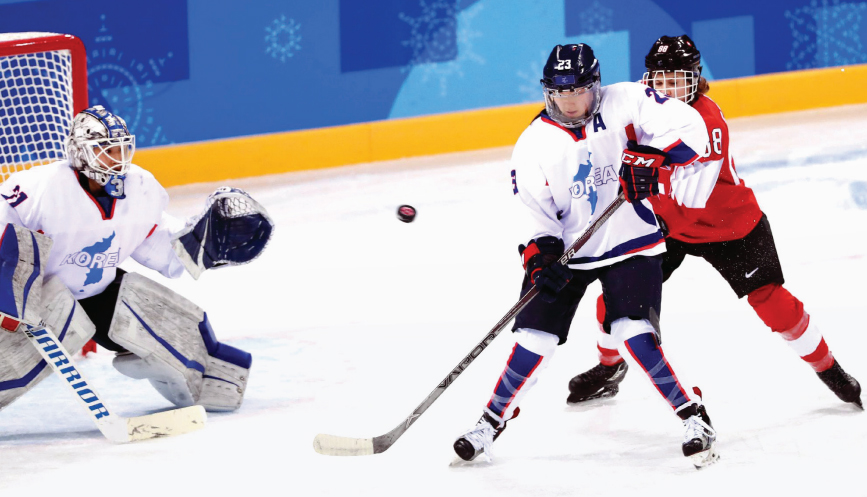เกี่ยวกับประเทศเกาหลี
1988 Seoul Summer Olympics (Games of the XXIV Olympiad)
The 1988 Summer Olympics, officially known as the Games of the XXIV Olympiad, were held in Seoul in 1988, marking a record number of athletes ever: 13,304 athletes from 160 countries. With the slogan: “Harmony and Progress,” the organizing committee set up the following objectives: participation of the largest number of athletes, worldwide harmony, best results, safety, and cost saving. Korea became the 16th country (and only the 2nd in Asia) to host the Summer Olympic Games. The competitions were held in 23 formal disciplines and 2 demonstration sports. Korea ranked 4th overall, winning 12 gold medals, 10 silver medals, and 11 bronze medals.

Emblem of the 1988 Summer Olympics(Games of the XXIV Olympiad)
The emblem was designed based on the triple taegeuk, a traditional pattern handed down among Koreans for many generations. The pattern has been widely used in entrances to private houses and handicrafts. It was used to symbolize a wish for the promotion of peace through the Olympics.
The 1988 Seoul Summer Olympics were very significant in that they served as a venue for reconciliation between the Western and Eastern Blocs, after the Western Bloc’s boycotting of the 1980 Moscow Summer Olympics (Games of the XXII Olympiad) and the Eastern Bloc’s retaliatory boycotting of the 1984 Los Angeles Summer Olympics (Games of the XXIII Olympiad). The event in Seoul transcended ideological conflict and racial discrimination pursuant to the Olympic Charter, and served as an occasion for publicizing the status of the country’s economic development and traditional culture, and the potential of Koreans worldwide.
2002 FIFA World Cup Korea/Japan (17th FIFA World Cup)
Held for 31 days (May 31 to June 30), the 2002 FIFA World Cup Korea/Japan (17th FIFA World Cup) was the first World Cup to be jointly hosted by two countries. It was also the first World Cup Tournament to be held outside Europe and the Americas. The event produced a series of unexpected results. In particular, Korea astonished the whole world by achieving remarkable success, namely, by reaching the semi-finals. Also, the enthusiastic cheering of soccer fans in red t-shirts, called the Red Devils, also served as an opportunity to promote another aspect of Korea to people around the world. This led to massive crowds to gather for street cheering nationwide. Tens of thousands of fans fervently cheering on their team in the dead of night created quite a sight. During the Korean team’s match against Germany for 4th place, a total of 6.5 million people filled the streets nationwide to cheer on their national team.

Koreans supporting the national team in front of Seoul City Hall during the 2002 FIFA World Cup Korea/Japan (17th FIFA World Cup). Many foreigners said that they were deeply impressed by the fans’ enthusiasm and unity. Still, the Red Devils continue to cheer for the national team in major tournaments.
2011 World Championships in Athletics
The 13th IAAF World Championships in Athletics was held in Daegu, the country’s third-largest city, from August 27 to September 4, 2011. Located in Daegu, an international city that modern technology merges into history, Daegu Stadium, also known as the Blue Arc, is a sports stadium where big international sports events were successfully held, such as the 2002 FIFA World Cup Korea/Japan (17th FIFA World Cup in 2002) and the 2003 Summer Universiade. It has presented vivid impressions of track and field events to the fans around the world through high-definition electronic scoreboards combined with cutting-edge ICT technology.
2018 PyeongChang Winter Olympics
Held from February 9 to 25, 2018, the 2018 Winter Olympics, commonly known as PyeongChang 2018, achieved new records in the history of winter sports. A total of 2,920 athletes from 92 countries participated in this international winter multi-sport event, the largest ever. Among the participating countries were six countries taking part in the Winter Olympics for the first time: Nigeria, Eritrea, Malaysia, Singapore, Ecuador, and Kosovo. This in turn expanded the base of winter sports. The excellent ice quality led to three world records and 25 Olympic records, and 1.08 million tickets were sold, making a big hit.

Joint inter-Korean women’s ice hockey team
Korea’s unified women’s ice hockey team at the 2018 PyeongChang Winter Olympics.
2019 Gwangju World Aquatics Championship
The 2019 World Aquatics Championship was held in Gwangju from July 12 to 28, 2019. A total of 7,507 athletes and staff members from 194 countries came to the city for 76 events across six categories: swimming, diving, high diving, artistic swimming, open water swimming, and water polo. The events were joined by 2,639 athletes from 194 countries, which was the largest in the history of the championship. China ranked first with 16 gold medals, and Korea ranked 23rd with one bronze medal. With the successful completion of the World Aquatics Championship, Korea became the fourth country to hold all of the world’s five mega sports events after Germany, Italy, and Japan.
